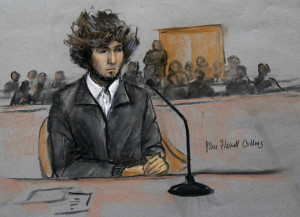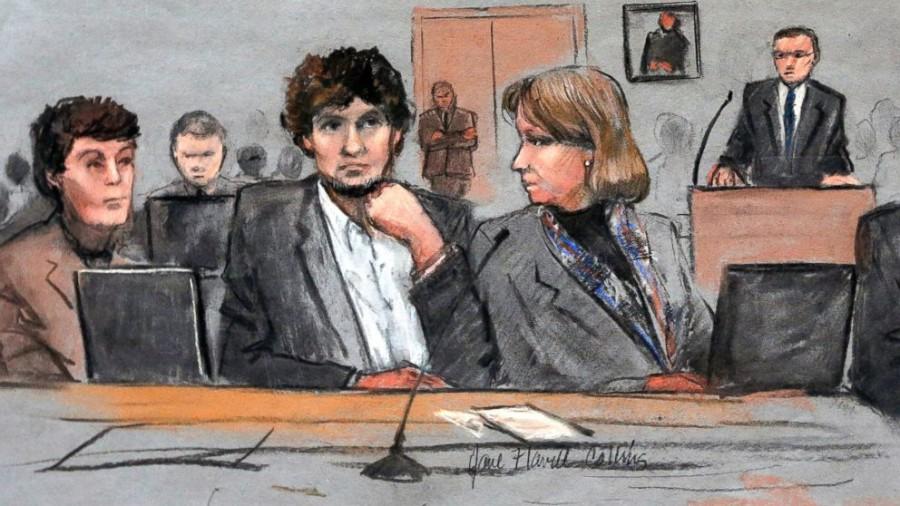Life or Death for Boston Bomber?
April 18, 2015
Roughly two years after causing the gut-wrenching, gory scene at the finish line of the Boston Marathon, Dzhokhar Tsarnaev has officially been found guilty on all 30 charges he faced in the Marathon bombing case.
On April 8th, the jury rattled off the 30 guilty counts one after another, while Tsarnaev remained stone-faced and emotionless by all accounts (it’s 2015, and in order to follow prominent federal cases, we still have to rely on court sketches or even follow them on Twitter, 140 characters at a time).
Thanks to Dzhokhar and his now-deceased brother Tamerlan, three innocent Marathon spectators (Krystle Campbell, Lingzi Lu, and eight-year-old Martin Richard) lost their lives on that sun-soaked turned vicious Patriots Day of April 15th, 2013. Dzhokhar was also on the hook for the additional bloodbaths that transpired in the days following the Marathon bombing, including the murder of MIT police officer Sean Collier, a carjacking, and a police firefight/shootout in Watertown.
The verdict obviously comes as no surprise whatsoever for those who have followed the story from the start. Now that the formality of a federal trial has wrapped up, the interesting decision now lies in the hands of the jurors as to whether to lay the hammer down on Tsarnaev with the death penalty, or if he should spend the rest of his life in prison. Of Tsarnaev’s 30 charges, 17 are death penalty-eligible.
Although the democrat-heavy Commonwealth of Massachusetts abolished capital punishment some 30 years ago, the death penalty is most certainly on the table here in this instance, with this being is a federal trial.
Sean Caruso, an AIC student who is from the Boston area, said he was not at all shocked upon hearing the guilty verdicts, but is on the fence when it comes to Tsarnaev’s penalty.
“I’m kind of iffy about it,” Caruso said. “I would like to see him killed, but at the same time, I wouldn’t mind seeing him rot in jail either. Plus, he could get terrorized to death in there.”
Caruso also noted that he actually competed against Tsarnaev in wrestling matches a couple times in high school, when the bomber attended Cambridge Rindge and Latin School. But Caruso says he doesn’t know much about Tsarnaev personally, other than “he was quiet and smoked a lot of pot.”

Communication Professor Mary Ellen Lowney definitely wants to see Tsarnaev’s life spared.
“My feeling is that Tsarnaev should spend the rest of his life in prison. He’s a bad guy who did awful things to innocent people,” said Lowney. “I’m personally opposed to the death penalty. To me it’s called murder, and it’s wrong.”
Meanwhile, a poll run by the New York Daily News shows overwhelming support for Tsarnaev’s death, giving more of a national perspective on the issue (when I cast my vote two days after the poll was posted, 70 percent of voters called for the death penalty). But back here at home, the lefties in Massachusetts remain adamant in their stance on capital punishment, despite the worst terrorist attack in the States since 9/11 happening in their own backyard.
From a tax dollars perspective, regardless of what comes out of the penalty phase, Massachusetts taxpayers may not be entirely thrilled either way. If Tsarnaev is sentenced to death, he’ll take a seat on costly death row for years upon years. Or, if he’s sentenced to life in prison, he may even get a cushy, maximum-security cell. Either way, it will happen on Massachusetts’ dime.
But then again, this wouldn’t be the first time a Tsarnaev has sponged off the taxpayers either – remember when it was revealed by the Boston Herald just a couple of weeks after the Marathon bombing that “the Tsarnaev family, including the suspected terrorists and their parents, benefited from more than $100,000 in taxpayer-funded assistance?” Interesting; so how is Tsarnaev able to afford the services of a high-profile defense attorney like Judy Clarke? Who’s going to be paying for that? Oh, and who was paying for Dzhokhar’s tenure at the University of Massachusetts-Dartmouth?
We really should not forget about those who have had to pay the worst price of all for the last two years, though: the families of Krystle Campbell, Lingzi Lu, Martin Richard and Sean Collier. In a statement, Boston Mayor Martin J. Walsh said he hopes the “verdict provides a small amount of closure for the survivors, families, and all impacted by the violent and tragic events.” This Tsarnaev verdict is just phase one of what has been a long road to closure and justice. The penalty phase begins on April 21st, so stay tuned.



